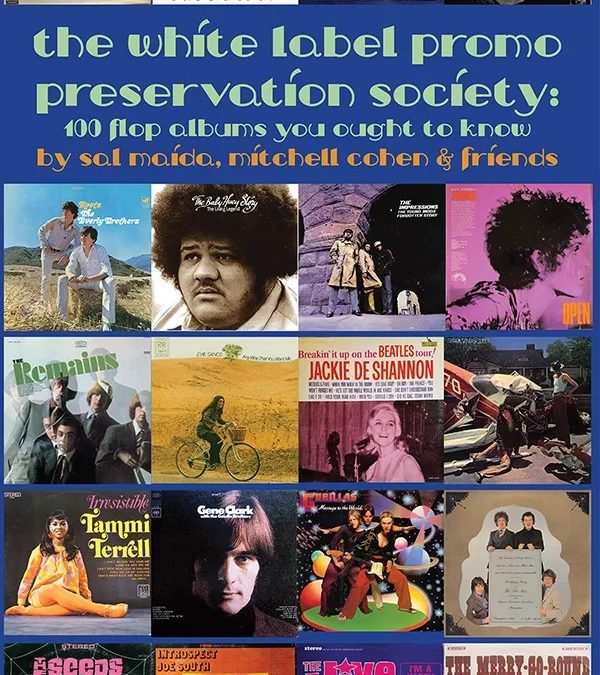Heylo Bassers,
I’m very excited and proud to have been asked by Sal Maida, to write an essay for The White Label Promo Preservation Society: 100 Flop Albums You Ought to Know by Sal Maida, Mitchell Cohen & Friends. I chose my essay on the band, Free, and their self-titled album, Free.
I would encourage you to buy the book because so many of the essays are really fun, interesting, and are a deep depth of knowledge. It’s truly an oral history by some really great and interesting writers. The foreword is by David Fricke.
https://hozacrecords.bandcamp.com/merch/the-white-label-promo-preservation-society-book
Here’s my essay, for your pleasure:
“You feel the beat a lot like Andy Fraser”, she said. Who’s Andy Fraser, I thought? I went home and looked him up and realized he was the bass player on Free’s “All Right Now.” The following week I went to Los Angeles to attend Bass Player Live and visited Amoeba Music on Sunset Boulevard for the first time. I bought “Tons of Sobs”, “Free”, and “Fire and Water” and when I returned to NYC, I listened and listened and listened to those albums. This was 2012-2013. What I lack in historical knowledge, I surely make up for in curiosity.
When I put on “Free” the bass line to “I’ll be Creepin’” shook my memory bank. I said to myself with a tint of shame, “I know this.” The bass is forthright, defined and explicitly sets the tone for the whole album. Andy Fraser was a teenager when he played in Free. He didn’t have to prove his worth in the band, or his talents. He let Paul Kossoff (guitar) do his thing and let Paul Rodgers (vocals) tell his story. Each musician let the songs breathe so that the space between notes and the space within the parts became even more important than what was played. Andy understood and settled into Simon Kirke’s timing and feel, and the magic in the rhythm is in where the bass “flourishments” lay. (That’s my special word for those unexpected embellishments which enhance the mood and the groove.) He was a bass player with patience and deference – not a player of fanfaronade. When I listen to “Laying in the Sunshine”, I feel like I’m lying outside feeling the sun on my face just like in the languid summer days of youth. The bass expresses what my heart is feeling – I’m calm, I’m dreaming, and casually thinking, “I’m happy here, so let me stay.” Life is so busy and it can be a merry-go-round in NYC. Andy is giving me permission to let me enjoy my moment in the sun, to be lazy.
“Woman” dips its big toe into the power of the hook and lays the foundation for the earworm “All Right Now.” The band is setting the stage for their future success. The riff interplay between Fraser and Kossoff sounds like each player is saying, “Yes, And” to each other, creating a space for Paul Rodgers to perfervidly make his plea to a special woman. To be so young and want a woman over a girl makes me think that maybe this woman is the one on the cover designed by Ron Raffaelli. The one with the long-stretched legs walking over the viewer’s perspective with a bluebird day behind her and a starry night inside her.
Free were young kids with an emotional depth that transcended their years. Most of my “Sad Morning” break-ups in my twenty-teens happened after a gin-soaked and drama-infused fight. You know, the highly emotional and nonsensical ones. “Mourning Sad Morning” projects real grief and despair. It makes me wonder whether the relationship ended not because of lack of love, or kindness and respect, but perhaps because the couple reached a crossroad. It feels like the type of anguish one faces in a break-up that isn’t anyone’s fault, but there’s a hopelessness in continuing. How sad.
“Free” is a complex album from four young men who felt life deeply. Each member of the ensemble put their ego aside and really thought about how to not just get the message across, but how to make the listener feel it vividly. This album is so gorgeous and emotional that it’s easy to forget the prodigious playing by Kirke, Kossoff, Rodgers and Fraser. But that’s the goal for a rock band, right? To have the listener forget about who’s doing what and how they’re doing what they’re doing. I like to think the goal is to have the listener feel what the band has to say. Kind of like what Maya Angelou said, “I’ve learned that people will forget what you said, people will forget what you did, but people will never forget how you made them feel.” I think this is true. People forget this gem of an album didn’t crack the top 200 in 1969, but does it really matter now?
Margaret LaBombard is a bass player in NYC who plays in her original band, Slyboots and one day will be brave enough to form a Free/Bad Company cover band. www.margaretlabombard.com
See you on the low end!
Love,
Mags

